Từ vựng IELTS band 4.5 theo mục đích diễn đạt và chủ đề
Key takeaways
Mức độ chính xác trong việc sử dụng từ - Khả năng paraphrasing và sử dụng collocation. 150 từ vựng nâng cao cho band 4.5.
Từ vựng IELTS band 4.5 là một trong những nền tảng quan trọng giúp người học chinh phục mục tiêu nâng cao điểm số trong kỳ thi IELTS. Ở band điểm này, vốn từ vựng của người học thường còn khá hạn chế về số lượng, phạm vi và mức độ chính xác khi sử dụng. Vì vậy, việc mở rộng và nâng cấp từ vựng IELTS band 4.5 lên mức 5.5 hoặc 6.0 là một bước đi cần thiết nếu người học muốn cải thiện kỹ năng Speaking và Writing rõ rệt. Thông qua bài viết này, tác giả sẽ giúp người học hiểu rõ đặc điểm từ vựng IELTS band 4.5, đồng thời cung cấp hệ thống từ vựng hữu ích, dễ áp dụng và phù hợp với bài thi thực tế.
Đặc điểm từ vựng IELTS band 4.5
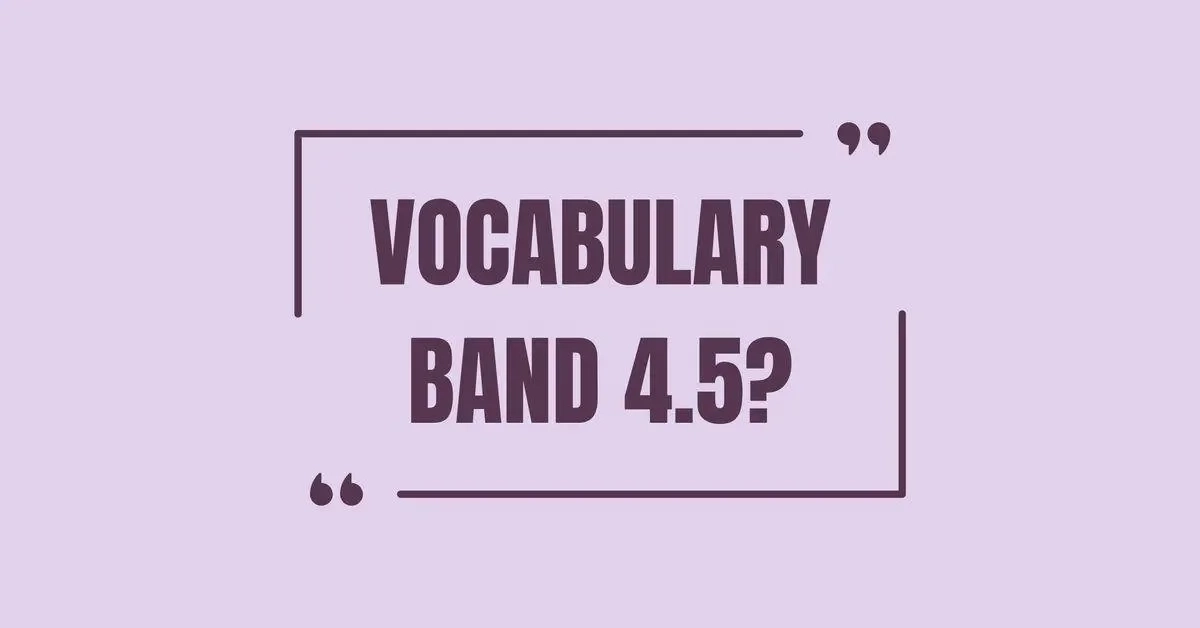
Ở trình độ IELTS band 4.5, người học thường đã có nền tảng từ vựng tốt hơn so với band 4.0. Thay vì chỉ sử dụng những từ đơn giản và phổ biến như good, bad, big, small, từ vựng IELTS band 4.5 có thể bao gồm một số từ đồng nghĩa hoặc từ mang ý nghĩa cụ thể hơn. Tuy nhiên, số lượng từ vựng vẫn còn khá hạn chế, ước tính trong khoảng 2000 từ phổ biến trong giao tiếp hằng ngày.
Theo giám khảo [1], thí sinh đạt band 4.5 có khả năng truyền đạt ý tưởng và kéo dài câu trả lời nhưng vốn từ còn đơn giản, lặp lại nhiều và ít đa dạng. Thí sinh đôi khi sẽ sử dụng được một số từ vựng nâng cao nhưng không nhiều, họ có cố gắng sử dụng từ vựng cao cấp hơn nhưng thường sử dụng sai khá thường xuyên. Một trong những vấn đề phổ biến ở band điểm này là việc lặp lại quá nhiều từ cơ bản trong bài nói hoặc bài viết, khiến ý diễn đạt trở nên nhàm chán và thiếu linh hoạt. Bên cạnh đó, người học thường phụ thuộc vào những từ quen thuộc, đơn giản và gặp khó khăn khi muốn mở rộng hoặc diễn đạt lại ý tưởng bằng cách paraphrasing. Ngoài ra, nhiều người còn sử dụng sai từ hoặc dùng từ không phù hợp với ngữ cảnh, đặc biệt là khi cố gắng sử dụng các từ học thuật chưa nắm rõ. Việc nhầm lẫn giữa các từ đồng nghĩa, kết hợp từ không tự nhiên (sai collocation) hoặc chưa biết cách dùng phrasal verbs và idioms cũng là hạn chế lớn ở band điểm này. Những yếu tố này khiến phần thể hiện từ vựng của người học bị đánh giá thấp về độ chính xác, tính đa dạng và khả năng sử dụng từ linh hoạt trong bài thi IELTS.
Sự khác biệt giữa từ vựng IELTS band 4.5 và band 5.5-6.0
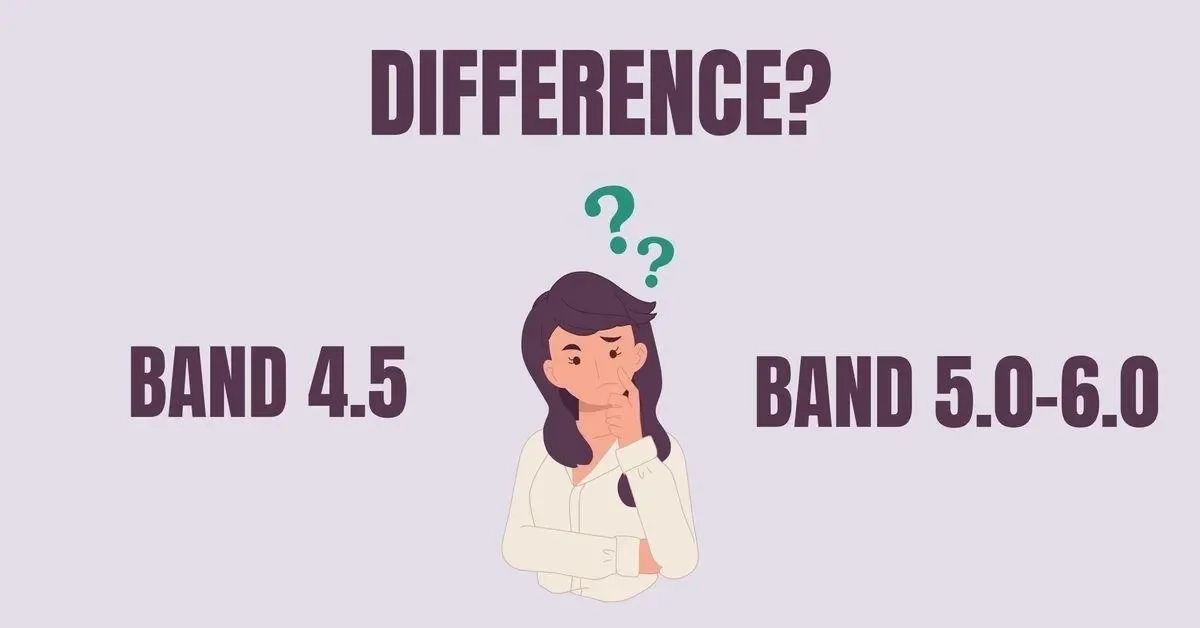
Sự khác biệt lớn nhất giữa từ vựng IELTS band 4.5 và band 5.5-6.0 không chỉ nằm ở số lượng từ vựng mà còn ở chất lượng và khả năng vận dụng từ một cách chính xác, linh hoạt và phù hợp với ngữ cảnh. Với từ vựng IELTS band 4.5, vốn từ chủ yếu xoay quanh các từ vựng đơn giản, thông dụng trong đời sống hằng ngày như nice, good, bad, big, small. Khả năng paraphrasing còn hạn chế, dễ lặp từ và ít biết các cách diễn đạt khác nhau cho cùng một ý tưởng. Ngoài ra, việc sử dụng collocation, phrasal verbs hay từ học thuật gần như rất ít hoặc chưa chính xác. Theo IELTS band descriptor, khác với từ vựng IELTS band 4.5, người dùng tiếng Anh ở cấp độ 5.5-6.0 đã có sự mở rộng rõ rệt về từ vựng, có thể sử dụng từ vựng một cách đa dạng hơn, tuy nhiên vẫn xuất hiện việc sử dụng từ sai ngữ cảnh. Số lượng từ vựng của band 5.5-6.0 cũng nhiều hơn đáng kể so với từ vựng IELTS band 4.5. Số lượng từ vựng ước tính của band 5.5-6.0, là khoảng 3000-3500 từ, nhưng với từ vựng IELTS band 4.5, con số này chỉ là hơn 2000 từ. [2]
Band 4.5 | Band 5.5-6.0 |
|---|---|
Vốn từ chủ yếu đơn giản | Vốn từ đã được mở rộng hơn |
Khả năng paraphrasing còn hạn chế | Đã có khả năng paraphrasing nhưng còn bị mắc lỗi hoặc chưa hiệu quả |
Ít cách diễn đạt khác nhau, bị lặp lại nhiều | Đã biết sử dụng các từ đồng nghĩa, các từ nâng cao hơn nhưng chưa nhiều |
Số lượng từ vựng khoảng hơn 2000 từ | Số lượng từ vựng từ 3000 - 3500 |
Đọc thêm: Từ vựng IELTS 6.0 theo chủ đề hữu ích cho Writing và Speaking
Từ vựng nâng cao cho band 4.5 theo mục đích diễn đạt
Từ vựng diễn đạt sự so sánh
Từ vựng | Phiên âm | Nghĩa | Ví dụ | Từ đồng nghĩa | Từ trái nghĩa |
|---|---|---|---|---|---|
similar | /ˈsɪm.ə.lər/ | giống nhau | This bag is similar to mine. | alike, same | different |
different | /ˈdɪf.ər.ənt/ | khác nhau | We have different opinions. | unlike, distinctive | similar |
compare | /kəmˈpeər/ | so sánh | I want to compare two books. | ||
contrast | /ˈkɒn.trɑːst/ | tương phản | The colors contrast sharply. | oppose | resemble |
alike | /əˈlaɪk/ | giống nhau | The two cats look alike. | similar, same | unlike |
unlike | /ʌnˈlaɪk/ | không giống | This room is unlike the others. | different, dissimilar | similar |
resemble | /rɪˈzem.bəl/ | giống với | She resembles her mother. | look like, be similar to | differ |
common | /ˈkɒm.ən/ | chung, phổ biến | That’s a common mistake. | usual, typical | rare |
typical | /ˈtɪp.ɪ.kəl/ | tiêu biểu | It’s a typical summer day. | usual, standard | unusual |
instead of | /ɪnˈsted əv/ | thay vì | I walked instead of driving. | in lieu of |
Từ vựng diễn đạt sự thay đổi
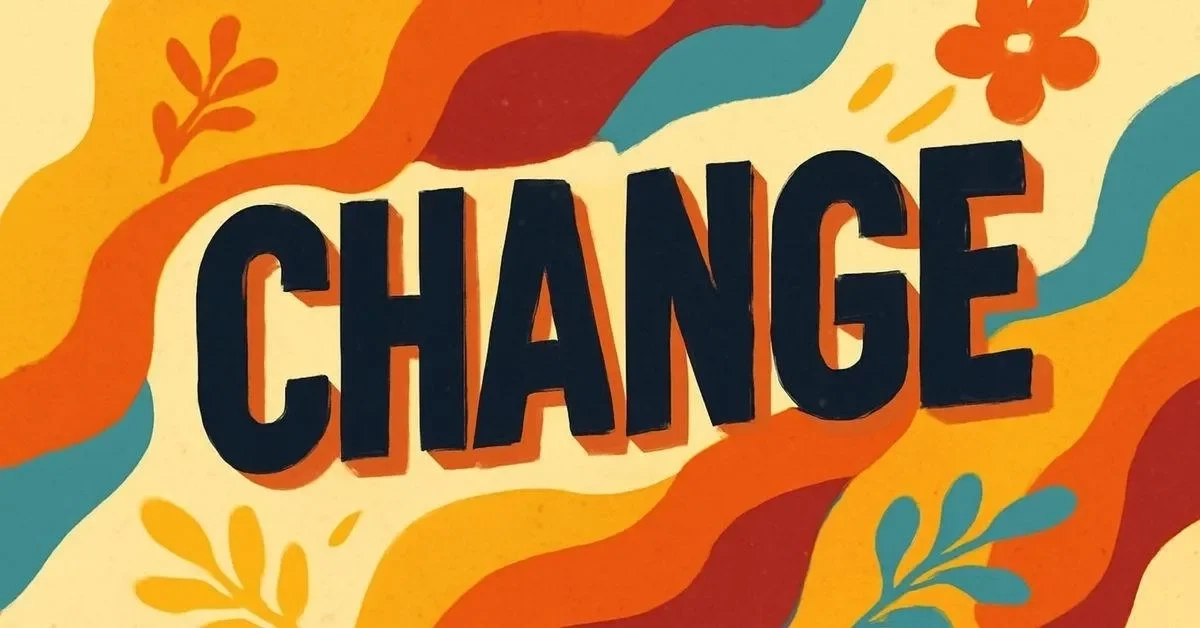
Từ vựng | Phiên âm | Nghĩa | Ví dụ | Từ đồng nghĩa | Từ trái nghĩa |
|---|---|---|---|---|---|
change | /tʃeɪndʒ/ | thay đổi | I want to change my job. | alter, modify | keep, remain |
grow | /ɡrəʊ/ | phát triển, lớn lên | Children grow fast. | develop, increase | shrink, decline |
increase | /ɪnˈkriːs/ | tăng lên | The price increased last year. | rise, grow | decrease, reduce |
decrease | /dɪˈkriːs/ | giảm | Pollution is decreasing. | drop, reduce | increase, grow |
develop | /dɪˈvel.əp/ | phát triển | Cities develop quickly. | grow, expand | shrink, be stagnant |
improve | /ɪmˈpruːv/ | cải thiện | I want to improve my English. | enhance, get better | worsen |
decline | /dɪˈklaɪn/ | suy giảm, giảm sút | The population declined. | decrease, drop | rise, increase |
reduce | /rɪˈdjuːs/ | giảm bớt | We must reduce waste. | decrease, lower | increase, add |
shift | /ʃɪft/ | chuyển đổi | The trend is shifting slowly. | move, change | stay, keep |
transform | /trænsˈfɔːm/ | biến đổi | The area has been transformed. | change, convert | remain, keep |
adapt | /əˈdæpt/ | thích nghi, điều chỉnh | Animals adapt to their environment. | adjust, change | |
vary | /ˈveə.ri/ | thay đổi, đa dạng | Prices vary every day. | differ, change | stabilize |
evolve | /ɪˈvɒlv/ | tiến hóa, phát triển dần | Languages evolve over time. | develop, progress | regress, stop |
adjust | /əˈdʒʌst/ | điều chỉnh | He adjusted his tie. | modify | remain |
fluctuate | /ˈflʌk.tʃu.eɪt/ | dao động, thay đổi thất thường | Prices fluctuate a lot. | swing, vary | stabilize |
Từ vựng diễn đạt Nguyên nhân - Kết quả
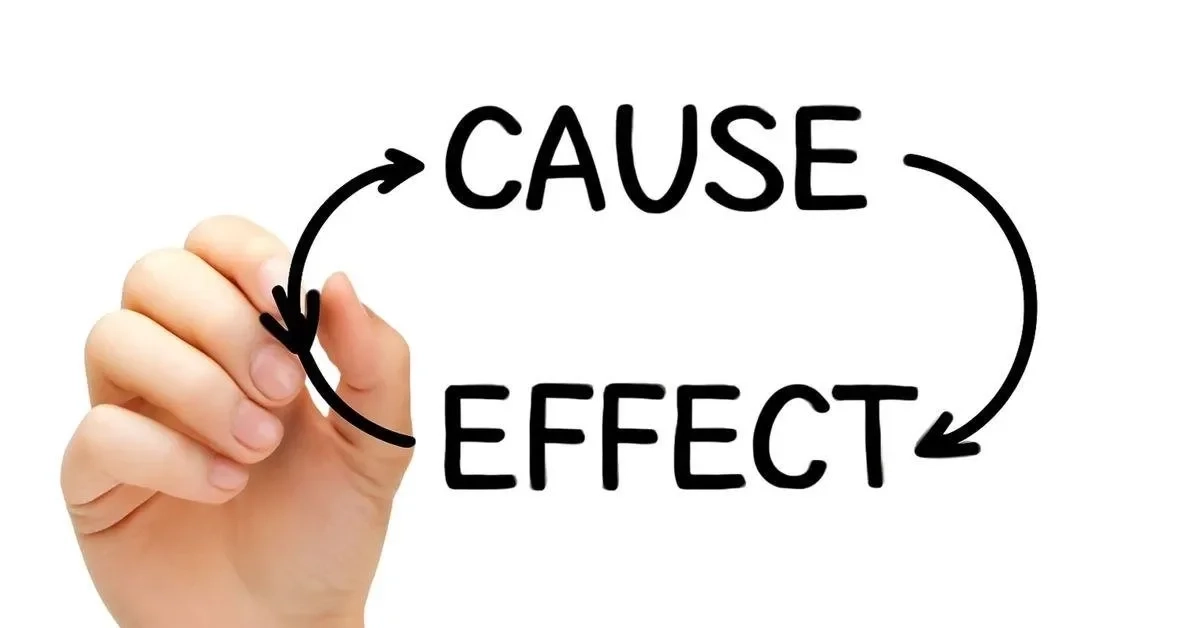
Từ vựng | Phiên âm | Nghĩa | Ví dụ | Từ đồng nghĩa | Từ trái nghĩa |
|---|---|---|---|---|---|
because | /bɪˈkɒz/ | bởi vì | I stayed home because it rained. | since, as | |
so | /səʊ/ | vì vậy | It was cold, so I wore a jacket. | therefore, thus | but |
cause | /kɔːz/ | gây ra | Smoking causes cancer. | lead to, result in | prevent, avoid |
result | /rɪˈzʌlt/ | kết quả | The result was a big success. | outcome, effect | cause (khi là động từ) |
lead to | /liːd tuː/ | dẫn đến | Stress can lead to illness. | cause, bring about | prevent, stop |
effect | /ɪˈfekt/ | ảnh hưởng, kết quả | The new law had a big effect. | impact, result | cause (nếu là danh từ) |
affect | /əˈfekt/ | ảnh hưởng đến (v) | The noise affects my sleep. | influence, impact | |
due to | /djuː tuː/ | do, bởi vì (nguyên nhân) | The flight was delayed due to rain. | because of, owing to | regardless of |
result in | /rɪˈzʌlt ɪn/ | dẫn đến (kết quả) | Lack of sleep results in tiredness. | cause, bring about | prevent |
therefore | /ˈðeə.fɔːr/ | do đó | He was late, therefore he missed it. | so, as a result | |
as a result | /æz ə rɪˈzʌlt/ | kết quả là | She worked hard. As a result, she won. | so, thus | |
since | /sɪns/ | vì, do | Since it rained, we stayed home. | because, as | |
contribute to | /kənˈtrɪb.juːt tuː/ | góp phần vào | Exercise contributes to good health. | add to, help | harm, damage |
bring about | /brɪŋ əˈbaʊt/ | mang lại, gây ra | The new plan brought about success. | cause, lead to | |
make | /meɪk/ | làm cho (kết quả) | Loud music makes me tired. | cause, create |
Từ vựng diễn đạt Đồng ý – Không đồng ý
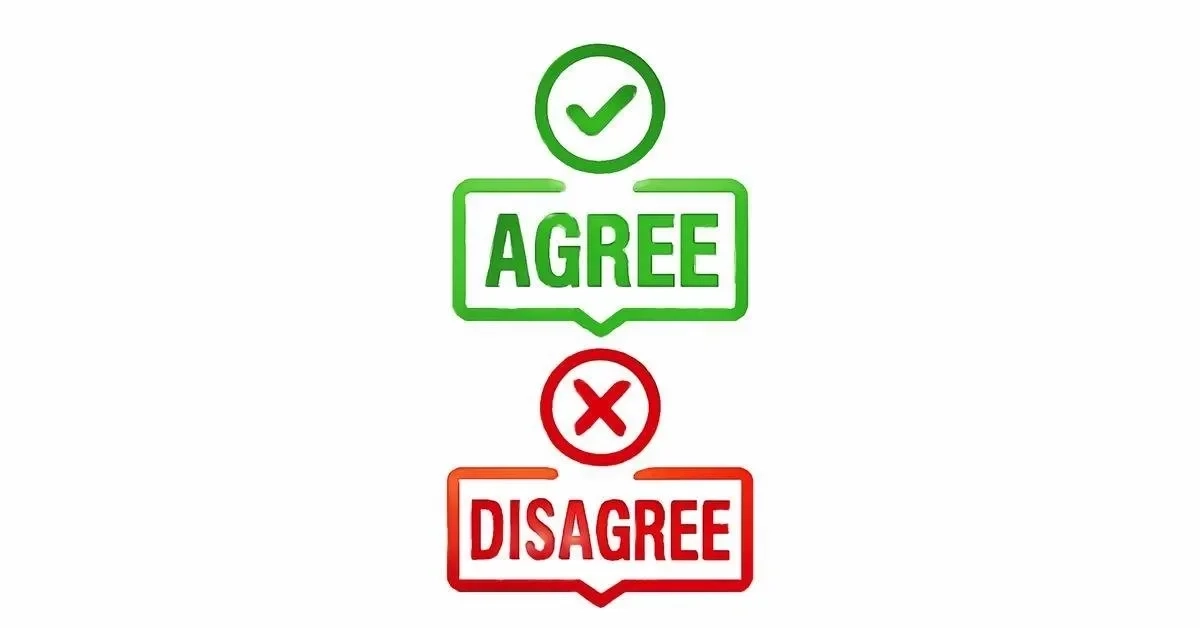
Từ vựng | Phiên âm | Nghĩa | Ví dụ | Từ đồng nghĩa | Từ trái nghĩa |
|---|---|---|---|---|---|
agree | /əˈɡriː/ | đồng ý | I agree with your idea. | accept, approve | disagree |
disagree | /ˌdɪs.əˈɡriː/ | không đồng ý | I disagree with that opinion. | object, oppose | agree |
opinion | /əˈpɪn.jən/ | ý kiến | What’s your opinion? | view, thought | |
think | /θɪŋk/ | nghĩ rằng | I think this is a good idea. | believe, feel | |
believe | /bɪˈliːv/ | tin tưởng, cho rằng | I believe he is right. | think, accept | doubt |
feel | /fiːl/ | cảm thấy | I feel that this is unfair. | sense, think | |
support | /səˈpɔːt/ | ủng hộ | I support the new rule. | back (v), agree with | oppose |
oppose | /əˈpəʊz/ | phản đối | They oppose the new plan. | disagree with, resist | support, accept |
in favor of | /ɪn ˈfeɪ.vər əv/ | ủng hộ (cái gì đó) | I’m in favor of shorter work hours. | support, agree with | against |
against | /əˈɡenst/ | chống lại | I’m against smoking in public. | oppose, object to | in favor of |
agree with | /əˈɡriː wɪð/ | đồng ý với | I agree with your answer. | support, accept | disagree with |
point | /pɔɪnt/ | quan điểm | That’s a good point. | idea, opinion | |
accept | /əkˈsept/ | chấp nhận | I accept your explanation. | agree to, approve | refuse, reject |
reject | /rɪˈdʒekt/ | từ chối | They rejected my suggestion. | turn down, refuse | accept, agree |
argue | /ˈɑːɡ.juː/ | tranh luận | They often argue about money. | debate, dispute | agree |
Từ vựng diễn đạt Vấn đề – Giải pháp
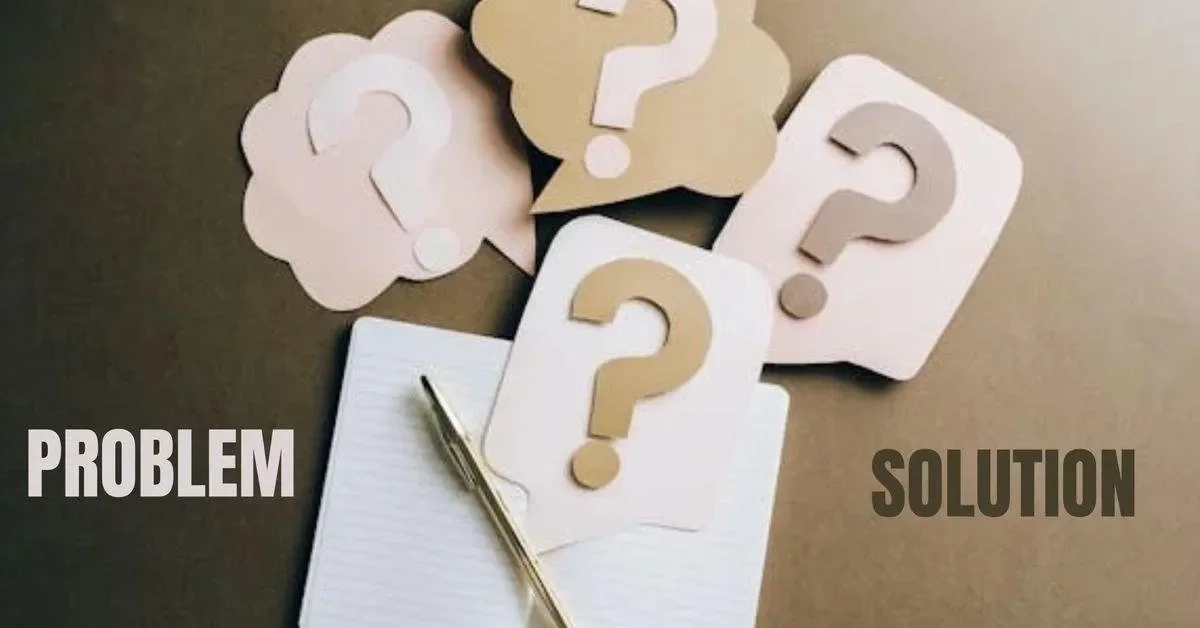
Từ vựng | Phiên âm | Nghĩa | Ví dụ | Từ đồng nghĩa | Từ trái nghĩa |
|---|---|---|---|---|---|
problem | /ˈprɒbləm/ | vấn đề | Pollution is a big problem. | issue, difficulty | solution |
issue | /ˈɪʃuː/ | vấn đề, sự việc | The issue is becoming more serious. | problem, matter | resolution |
difficulty | /ˌdɪfɪˈkʌlti/ | khó khăn | She faced many difficulties in life. | problem, challenge | ease, simplicity |
challenge | /ˈtʃælɪndʒ/ | thử thách, thách thức | Learning a new language is a challenge. | difficulty, problem | |
solve | /sɒlv/ | giải quyết | We need to solve this problem soon. | resolve, fix | create, worsen |
solution | /səˈluːʃən/ | giải pháp | We found a solution to the issue. | answer, remedy | problem, issue |
remedy | /ˈremədi/ | phương thuốc, biện pháp | Exercise is a good remedy for stress. | solution, cure | problem, issue |
fix | /fɪks/ | sửa chữa, khắc phục | Can you fix the broken chair? | repair, solve | break, worsen |
resolve | /rɪˈzɒlv/ | giải quyết, quyết định | We must resolve the issue now. | settle, solve | exacerbate, complicate |
improve | /ɪmˈpruːv/ | cải thiện | The company is working to improve its services. | enhance, better | worsen |
prevent | /prɪˈvent/ | ngăn chặn | To prevent accidents, follow the rules. | stop, avoid | allow, encourage |
avoid | /əˈvɔɪd/ | tránh | Avoid speaking too loudly. | prevent, refrain | face, encounter |
eliminate | /ɪˈlɪmɪneɪt/ | loại bỏ | We need to eliminate the waste. | remove, get rid of | keep, retain |
encourage | /ɪnˈkʌrɪdʒ/ | khuyến khích | We should encourage people to recycle. | motivate, inspire | discourage, prevent |
Từ vựng diễn đạt ví dụ
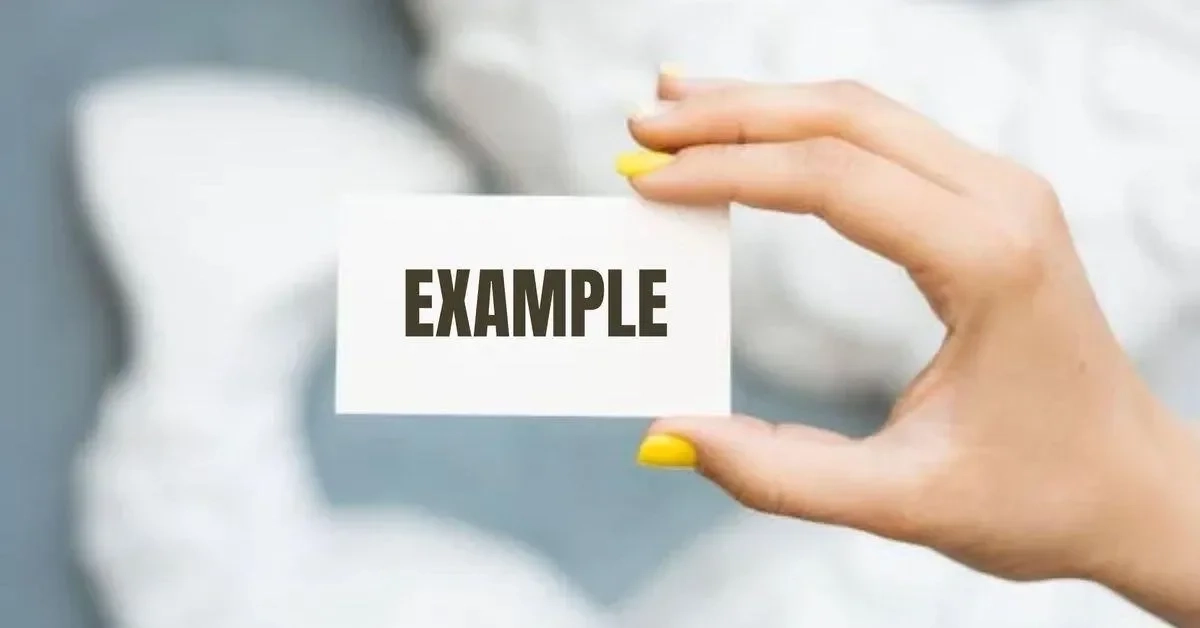
Từ vựng | Phiên âm | Nghĩa | Ví dụ | Từ đồng nghĩa | Từ trái nghĩa |
|---|---|---|---|---|---|
for example | /fɔːr ɪɡˈzɑːmpl/ | ví dụ như | For example, some people prefer tea. | for instance, such as | — |
such as | /sʌtʃ æz/ | chẳng hạn như | Many animals, such as dogs and cats, can be pets. | for example, like | — |
namely | /ˈneɪmli/ | nghĩa là, cụ thể là | He has three favorite colors, namely red, blue, and green. | that is, specifically | — |
like | /laɪk/ | như | There are many sports, like football and basketball. | for example, such as | — |
in particular | /ɪn pəˈtɪkjʊlər/ | đặc biệt là | I enjoy outdoor activities, in particular hiking. | especially, notably | — |
to illustrate | /tuː ˈɪləsˌtreɪt/ | minh họa | To illustrate, let’s look at the data. | for example, as an example | — |
for instance | /fɔːr ˈɪn.stəns/ | ví dụ, chẳng hạn | For instance, many students are struggling with online classes. | for example, such as | — |
in other words | /ɪn ˈʌðər wɜːdz/ | nói cách khác | He is a great player, in other words, he is very skilled. | that is to say | — |
as an example | /æz æn ɪɡˈzɑːmpl/ | ví dụ điển hình | Let’s take this case as an example. | for example, for instance | — |
Từ vựng diễn đạt Ưu điểm – Nhược điểm
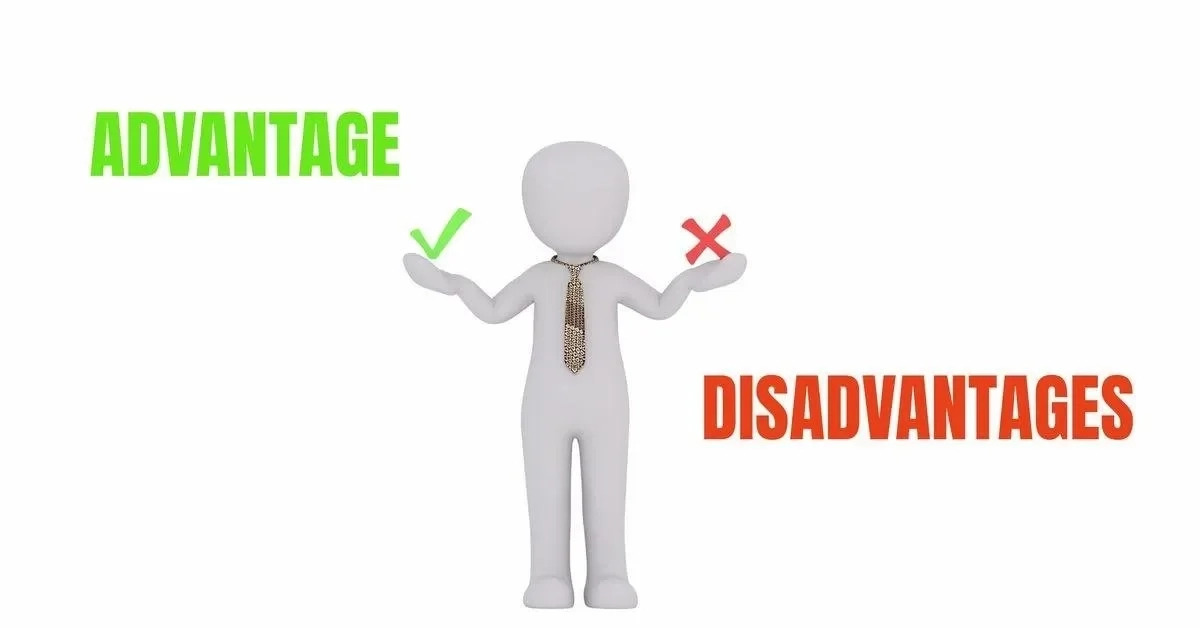
Từ vựng | Phiên âm | Nghĩa | Ví dụ | Từ đồng nghĩa | Từ trái nghĩa |
|---|---|---|---|---|---|
advantage | /ədˈvɑːntɪdʒ/ | ưu điểm | One advantage of living in the city is better public transport. | benefit, merit | disadvantage |
disadvantage | /ˌdɪsədˈvɑːntɪdʒ/ | nhược điểm | One disadvantage of living in the city is the high cost of living. | drawback, shortcoming | advantage |
benefit | /ˈbɛnɪfɪt/ | lợi ích, ưu điểm | There are many benefits to regular exercise. | advantage, gain | drawback, disadvantage |
drawback | /ˈdrɔːbæk/ | hạn chế, nhược điểm | The main drawback of this plan is its high cost. | disadvantage, limitation | benefit |
merit | /ˈmɛrɪt/ | ưu điểm | This idea has great merit. | worth, value | fault, weakness |
pros | /prəʊz/ | ưu điểm (thường dùng số nhiều) | There are many pros to this decision. | advantages, benefits | cons |
cons | /kɒnz/ | nhược điểm (thường dùng số nhiều) | The cons of the project include its cost. | disadvantages, drawbacks | pros |
positive | /ˈpɒzɪtɪv/ | tích cực, ưu điểm | The positive side of working from home is flexibility. | beneficial, favorable | negative |
negative | /ˈnɛɡətɪv/ | tiêu cực, nhược điểm | The negative side of living far from work is the long commute. | harmful, undesirable | positive |
strength | /strɛŋθ/ | điểm mạnh, ưu thế | His strength is his ability to communicate clearly. | advantage, asset | weakness, flaw |
weakness | /ˈwiːknɪs/ | điểm yếu, nhược điểm | One weakness of the plan is its lack of detail. | disadvantage, flaw | strength |
benefit from | /ˈbɛnɪfɪt frəm/ | được hưởng lợi từ | Many people benefit from using public transportation. | gain from, profit from | lose from |
Từ vựng miêu tả

Từ vựng | Phiên âm | Nghĩa | Ví dụ | Từ đồng nghĩa | Từ trái nghĩa |
|---|---|---|---|---|---|
enormous | /ɪˈnɔːməs/ | to lớn khổng lồ | The elephant is enormous. | huge, massive | tiny, small |
tiny | /ˈtaɪni/ | rất nhỏ | The baby has tiny fingers. | small, minute | huge, enormous |
stunning | /ˈstʌnɪŋ/ | tuyệt đẹp | The view from the mountain is stunning. | beautiful, gorgeous | ugly, unattractive |
dreadful | /ˈdrɛdfl/ | kinh khủng, tệ hại | The weather was dreadful yesterday. | terrible, awful | wonderful, pleasant |
towering | /ˈtaʊərɪŋ/ | cao chót vót | A towering building stood in the center. | tall, high-rise | low, short |
ancient | /ˈeɪnʃənt/ | cổ xưa | This is an ancient temple. | old, historic | modern, new |
spotless | /ˈspɒtləs/ | sạch bong | The kitchen is spotless. | clean, immaculate | dirty, messy |
filthy | /ˈfɪlθi/ | bẩn thỉu | His hands were filthy after work. | dirty, grimy | clean, spotless |
delighted | /dɪˈlaɪtɪd/ | rất vui | She was delighted with her gift. | happy, pleased | sad, disappointed |
miserable | /ˈmɪzrəbl/ | buồn khổ, tồi tệ | He felt miserable after the test. | unhappy, depressed | happy, cheerful |
boiling | /ˈbɔɪlɪŋ/ | nóng như thiêu đốt | It's boiling outside today. | very hot, scorching | freezing, cold |
freezing | /ˈfriːzɪŋ/ | lạnh cóng | My hands are freezing. | icy, very cold | boiling, hot |
tranquil | /ˈtræŋkwɪl/ | yên bình | The lake is a tranquil place. | calm, peaceful | noisy, chaotic |
deafening | /ˈdɛfnɪŋ/ | ầm ĩ điếc tai | The sound of the fireworks was deafening. | very loud, thunderous | quiet, silent |
rapid | /ˈræpɪd/ | nhanh chóng | The company's growth was rapid. | fast, quick | slow, gradual |
polite | /pəˈlaɪt/ | lịch sự | He is always polite to guests. | respectful, courteous | rude, impolite |
rude | /ruːd/ | thô lỗ | It’s rude to interrupt someone. | impolite, disrespectful | polite, kind |
generous | /ˈdʒɛnərəs/ | hào phóng | He is very generous with his time. | giving, kind | selfish, stingy |
selfish | /ˈsɛlfɪʃ/ | ích kỷ | She’s too selfish to share. | egotistic, greedy | generous, caring |
Đọc thêm: Tổng hợp 1000 từ vựng IELTS theo chủ đề thông dụng [PDF]
Từ vựng học thuật cơ bản cho band 4.5
Ở trình độ IELTS band 4.5, người học nên bắt đầu làm quen với các từ vựng học thuật – những từ thường xuyên xuất hiện trong các bài đọc học thuật, bài viết hoặc bài nói mang tính phân tích. Đây là bước đệm giúp bạn nâng cao khả năng sử dụng ngôn ngữ học thuật, chuẩn bị cho các band điểm cao hơn.
Từ vựng | Nghĩa | Ví dụ | Từ thường tương đương |
|---|---|---|---|
benefit | lợi ích | Exercise has many health benefits. | good thing, plus |
issue | vấn đề | Pollution is a serious issue today. | problem |
increase (v) | tăng lên | The number of users increased last year. | go up |
decrease (v) | giảm xuống | Pollution levels decreased in 2020. | go down |
affect | ảnh hưởng | Climate change affects everyone. | hurt, change |
factor | yếu tố | Age is an important factor in learning. | reason, cause |
require (v) | yêu cầu, đòi hỏi | Many jobs require a degree. | need |
environment | môi trường | We must protect the environment. | surroundings |
develop | phát triển | Children develop quickly. | grow, build |
solution | giải pháp | A possible solution is to recycle. | fix, answer |
important | quan trọng | Education is an important part of life. | big, serious |
support | ủng hộ, hỗ trợ | Many people support the new law. | help, back up |
result | kết quả | The result was a big improvement. | outcome, effect |
reason | lý do | There are many reasons for this problem. | cause, explanation |
compare | so sánh | We can compare city life with rural life. | |
contrast | tương phản | There is a contrast between rich and poor. | difference |
increase (n) | sự gia tăng | There was an increase in prices last year. | rise, growth |
method | phương pháp | This is a good method to learn vocabulary. | way, technique |
common | phổ biến | It's common to eat rice in Asia. | usual, regular |
challenge | thách thức | Studying abroad is a big challenge. | difficulty, obstacle |
ability | khả năng | She has the ability to speak three languages. | skill, talent |
average | trung bình | The average age of students is 20. | typical, normal |
major | chính, lớn | Pollution is a major problem. | big, main |
minor | nhỏ, phụ | There are some minor mistakes. | small, little |
economy | nền kinh tế | The country’s economy is growing fast. | financial system |
education | giáo dục | Education is key to success. | learning, schooling |
health | sức khỏe | Health is more important than money. | fitness, wellness |
population | dân số | The population of the city is over one million. | number of people |
reduce | giảm | We must reduce air pollution. | lower, cut down |
improve | cải thiện | We need to improve the transport system. | get better, upgrade |
access | quyền truy cập | Many students do not have access to the Internet. | use, reach |
global | toàn cầu | Global warming is a serious issue. | worldwide |
local | địa phương | Local businesses are important. | nearby, regional |
data | dữ liệu | The data shows a rise in temperature. | information, facts |
research | nghiên cứu | More research is needed to solve this issue. | study, investigation |
technology | công nghệ | Technology makes life easier. | tech, machines |
policy | chính sách | The government introduced a new policy. | rule, guideline |
environment | môi trường | Factories harm the natural environment. | surroundings, nature |
process | quá trình | Learning a language is a long process. | system, cycle |
resource | tài nguyên | Water is a limited natural resource. | supply, material |
trend | xu hướng | There is a trend toward online learning. | movement, tendency |
limit | giới hạn | The government set a limit on emissions. | restriction, cap |
economy | nền kinh tế | The economy is improving. | system, market |
individual | cá nhân | Each individual should take action. | person, human |
Đọc thêm: Danh sách từ vựng học thuật cho IELTS | AWL Sub-list 1 (Phần 1)
Từ vựng IELTS band 4.5 theo 10 chủ đề phổ biến
1. Education (Giáo dục)

Từ vựng | Nghĩa | Ví dụ |
|---|---|---|
curriculum | chương trình học | The curriculum needs to be updated regularly. |
assessment | đánh giá, kiểm tra | Student assessment is often based on exams. |
academic | học thuật | Academic performance varies across students. |
pedagogy | phương pháp giảng dạy | Pedagogy is crucial to shaping students' minds. |
scholarship | học bổng | She earned a scholarship for her excellent grades. |
literacy | sự hiểu biết, khả năng đọc viết | Literacy is essential for success in the modern world. |
tuition | học phí | Tuition fees have risen significantly in recent years. |
graduate | tốt nghiệp | She will graduate from university next year. |
enrolment | sự ghi danh, đăng ký | The university's enrollment numbers have increased. |
institution | cơ sở giáo dục | The institution offers a wide range of subjects. |
faculty | giảng viên, khoa học | The faculty of science at the university is renowned. |
lecture | bài giảng | The professor gave an interesting lecture on history. |
discipline | ngành học, kỷ luật | Science is a discipline that requires a lot of focus. |
tuition fees | học phí | High tuition fees prevent many students from attending university. |
exam | kỳ thi | Students must pass an exam to complete the course. |
2. Environment (Môi trường)
Từ vựng | Nghĩa | Ví dụ |
|---|---|---|
pollution | ô nhiễm | Air pollution is a growing problem in many cities. |
sustainability | tính bền vững | Sustainable practices are key to protecting the environment. |
climate change | biến đổi khí hậu | Climate change is causing unpredictable weather patterns. |
deforestation | nạn phá rừng | Deforestation leads to the loss of biodiversity. |
ecosystem | hệ sinh thái | A healthy ecosystem is vital for the planet's survival. |
biodiversity | đa dạng sinh học | Biodiversity is essential for maintaining a balanced ecosystem. |
waste management | quản lý chất thải | Waste management is essential for reducing pollution. |
renewable energy | năng lượng tái tạo | Solar and wind power are examples of renewable energy sources. |
conservation | bảo tồn | Wildlife conservation programs help protect endangered species. |
global warming | sự nóng lên toàn cầu | Global warming threatens coastal areas. |
habitat | môi trường sống | Many species are losing their natural habitat due to urban expansion. |
recycling | tái chế | Recycling reduces the amount of waste in landfills. |
carbon footprint | dấu vết carbon | Companies are trying to reduce their carbon footprint. |
ozone layer | tầng ozone | The depletion of the ozone layer increases harmful UV radiation. |
3. Technology (Công nghệ)

Từ vựng | Nghĩa | Ví dụ | Từ đồng nghĩa |
|---|---|---|---|
innovation | sự đổi mới, sáng tạo | Innovation is the driving force behind technological progress. | invention |
artificial intelligence (AI) | trí tuệ nhân tạo | AI is transforming industries such as healthcare and finance. | machine learning |
automation | tự động hóa | Automation in factories has increased production efficiency. | mechanization |
gadget | thiết bị công nghệ | Modern gadgets such as smartphones have become indispensable. | device, appliance |
digital | kỹ thuật số | Digital technology has revolutionized the way we communicate. | electronic |
cybersecurity | an ninh mạng | Cybersecurity is critical in protecting personal data online. | internet security |
internet of things (IoT) | internet vạn vật | IoT allows devices to communicate and exchange data. | smart technology |
software | phần mềm | The software can help improve efficiency in various tasks. | program, application |
hardware | phần cứng | Computer hardware is constantly evolving with new designs. | equipment |
cloud computing | điện toán đám mây | Cloud computing has made data storage and sharing more convenient. | online storage |
virtual reality | thực tế ảo | Virtual reality is used in gaming and training simulations. | VR |
e-commerce | thương mại điện tử | E-commerce has become an integral part of modern business. | online shopping |
database | cơ sở dữ liệu | The company’s database stores millions of customer records. | data storage |
algorithm | thuật toán | Algorithms are used in search engines to provide relevant results. | formula |
4. Health (Sức khỏe)

Từ vựng | Nghĩa | Ví dụ | Từ đồng nghĩa |
|---|---|---|---|
nutrition | dinh dưỡng | Proper nutrition is essential for a healthy lifestyle. | diet, nourishment |
wellness | sức khỏe, sự khỏe mạnh | Yoga promotes mental and physical wellness. | health, fitness |
disease | bệnh | Smoking is linked to many diseases, including cancer. | illness, condition |
prevention | sự phòng ngừa | Regular exercise is crucial for disease prevention. | deterrence |
hygiene | vệ sinh | Good hygiene practices can prevent the spread of illness. | cleanliness |
vaccine | vắc-xin | Vaccination programs have helped reduce infectious diseases. | immunization |
treatment | điều trị | The treatment for the disease involves medication and rest. | therapy, remedy |
addiction | nghiện | Addiction to alcohol can lead to serious health issues. | dependence |
fitness | thể dục, sức khỏe | Physical fitness is vital for overall well-being. | exercise, strength |
mental health | sức khỏe tinh thần | Mental health is equally as important as physical health. | emotional health |
obesity | béo phì | Obesity is a growing problem in many countries. | overweight |
cardiovascular | tim mạch | Cardiovascular diseases are a leading cause of death. | heart disease |
lifestyle | lối sống | A healthy lifestyle includes a balanced diet and regular exercise. | habits |
surgery | phẫu thuật | Surgery may be necessary for certain medical conditions. | operation |
5. Society (Xã hội)

Từ vựng | Nghĩa | Ví dụ |
|---|---|---|
equality | sự bình đẳng | Equality between genders is crucial for a fair society. |
inequality | sự bất bình đẳng | Economic inequality remains a pressing issue in many countries. |
community | cộng đồng | A strong sense of community helps individuals thrive. |
poverty | nghèo đói | Poverty is a major problem in developing countries. |
justice | công lý | The justice system should treat everyone equally. |
discrimination | sự phân biệt đối xử | Discrimination based on race is illegal in many countries. |
diversity | sự đa dạng | Cultural diversity enriches societies in many ways. |
social welfare | phúc lợi xã hội | Social welfare programs are essential for supporting the poor. |
rights | quyền lợi | Human rights must be protected at all costs. |
urbanization | đô thị hóa | Urbanization leads to both opportunities and challenges. |
citizenship | quyền công dân | Citizenship grants individuals rights and duties within a country. |
globalization | toàn cầu hóa | Globalization has led to increased international trade. |
migration | di cư | Migration patterns have changed due to political instability. |
inequality | sự bất công | Inequality in income distribution creates social tension. |
6 Work (Công việc)

Từ vựng | Nghĩa | Ví dụ |
|---|---|---|
career | sự nghiệp | A successful career often requires years of hard work. |
employment | việc làm | Employment rates have increased in many countries. |
workforce | lực lượng lao động | The workforce is shrinking due to an aging population. |
salary | lương | Salary levels have been rising in the tech industry. |
promotion | thăng tiến | She received a promotion after working for five years. |
job satisfaction | sự hài lòng với công việc | Job satisfaction is crucial for employee productivity. |
qualification | bằng cấp | Higher qualifications are required for advanced positions. |
interview | cuộc phỏng vấn | Preparing for an interview is essential for success. |
employer | nhà tuyển dụng | Employers should offer competitive benefits to attract workers. |
employee | nhân viên | Employees are expected to adhere to company policies. |
freelance | làm việc tự do | Many young people are choosing to freelance instead of taking full-time jobs. |
workplace | nơi làm việc | A positive workplace environment boosts employee morale. |
productivity | năng suất lao động | Improved productivity is a result of effective training. |
internship | thực tập | An internship provides valuable work experience. |
task | nhiệm vụ | Completing tasks on time is essential in the workplace. |
7. Transportation (Giao thông)

Từ vựng | Nghĩa | Ví dụ |
|---|---|---|
commute | đi lại, di chuyển | Many people commute long distances to work every day. |
traffic | giao thông | Heavy traffic causes delays during rush hour. |
infrastructure | cơ sở hạ tầng | Poor infrastructure can hinder economic development. |
public transport | giao thông công cộng | Public transport is an affordable and eco-friendly option. |
congestion | tắc nghẽn | Traffic congestion in major cities is a serious problem. |
road safety | an toàn giao thông | Road safety measures can reduce traffic accidents. |
transportation system | hệ thống giao thông | The transportation system in the city is outdated. |
cycle lane | làn đường dành cho xe đạp | Building more cycle lanes encourages healthy commuting. |
carpooling | đi chung xe | Carpooling reduces the number of vehicles on the road. |
emission | khí thải | Reducing emissions is essential for protecting the environment. |
vehicle | phương tiện | Electric vehicles are becoming more popular. |
infrastructure development | phát triển cơ sở hạ tầng | Infrastructure development is crucial for urban growth. |
fuel efficiency | hiệu quả sử dụng nhiên liệu | Fuel efficiency is a key factor in reducing transport costs. |
pedestrian | người đi bộ | The city has developed more pedestrian-friendly spaces. |
8 Globalization (Toàn cầu hóa)

Từ vựng | Nghĩa | Ví dụ |
|---|---|---|
global network | mạng lưới toàn cầu | The internet has facilitated the creation of a global network. |
interconnected | kết nối với nhau | We live in an interconnected world, where events in one country affect others. |
international | quốc tế | International cooperation is necessary for solving global issues. |
cultural exchange | giao lưu văn hóa | Cultural exchange programs help people understand different societies. |
trade | thương mại | Global trade has led to economic growth in many countries. |
cross-border | xuyên biên giới | Cross-border business transactions are increasing due to globalization. |
economic growth | tăng trưởng kinh tế | Globalization can drive economic growth in developing countries. |
outsourcing | gia công, thuê ngoài | Many companies are outsourcing their manufacturing to cheaper countries. |
diversity | sự đa dạng | Globalization promotes cultural and economic diversity. |
multinational | đa quốc gia | Multinational companies often have a significant influence on local economies. |
technology transfer | chuyển giao công nghệ | Technology transfer between countries has accelerated due to globalization. |
interconnectedness | sự kết nối | Global interconnectedness requires new international policies. |
9. Media (Truyền thông)

Từ vựng | Nghĩa | Ví dụ |
|---|---|---|
journalism | báo chí | Journalism plays a vital role in informing the public. |
broadcast | phát sóng | The news was broadcast on television last night. |
media coverage | sự phủ sóng truyền thông | Media coverage of the event was widespread. |
advertising | quảng cáo | Advertising influences consumer behavior. |
censorship | kiểm duyệt | Censorship of the media is a controversial issue. |
social media | truyền thông xã hội | Social media platforms are widely used for communication. |
news outlet | phương tiện truyền thông | Newspapers are an important news outlet for many people. |
fake news | tin giả | The rise of fake news is a significant problem in the media. |
public relations | quan hệ công chúng | Public relations campaigns can improve a company's image. |
journalism ethics | đạo đức báo chí | Journalists must follow strict ethics to maintain trust. |
entertainment | giải trí | Television is a major source of entertainment for people worldwide. |
digital media | phương tiện truyền thông kỹ thuật số | Digital media has transformed the way we consume information. |
press freedom | tự do báo chí | Press freedom is essential in democratic societies. |
10. Culture (Văn hóa)

Từ vựng | Nghĩa | Ví dụ |
|---|---|---|
tradition | truyền thống | Many countries have long-standing traditions. |
heritage | di sản | Cultural heritage should be preserved for future generations. |
globalization | toàn cầu hóa | Globalization has led to the spread of diverse cultural influences. |
multicultural | đa văn hóa | Multicultural societies benefit from the exchange of ideas. |
diversity | sự đa dạng | Diversity in culture enriches society in many ways. |
rituals | nghi lễ | Religious rituals are an important part of many cultures. |
customs | phong tục | Certain customs are unique to specific regions. |
identity | bản sắc | Cultural identity is crucial to maintaining a sense of community. |
art | nghệ thuật | Art reflects the cultural values of a society. |
cuisine | ẩm thực | Cuisine plays a significant role in defining cultural identity. |
folklore | truyền thuyết, dân gian | Folklore and storytelling are key elements of many cultures. |
language | ngôn ngữ | Language is a key component of cultural identity. |
beliefs | niềm tin | Cultural beliefs influence everyday life. |
Collocation cần thiết cho band 4.5
1. Verb + Noun Collocation (Cụm động từ + danh từ)
Cụm động từ + danh từ | Nghĩa | Ví dụ |
|---|---|---|
make a decision | đưa ra quyết định | It is important to make a decision quickly in business situations. |
take responsibility | nhận trách nhiệm | Students should take responsibility for their own learning. |
achieve success | đạt được thành công | He worked hard to achieve success in his career. |
raise awareness | nâng cao nhận thức | The campaign aims to raise awareness about environmental issues. |
face challenges | đối mặt với thách thức | Many businesses face challenges due to economic instability. |
2. Adjective + Noun Collocation (Cụm tính từ + danh từ)
Cụm tính từ + danh từ | Nghĩa | Ví dụ |
|---|---|---|
great impact | tác động lớn | Technology has had a great impact on education. |
serious problem | vấn đề nghiêm trọng | Climate change is a serious problem that requires immediate attention. |
high quality | chất lượng cao | The company produces high-quality products that satisfy customers. |
common mistake | lỗi phổ biến | A common mistake students make in writing is poor grammar. |
valuable experience | kinh nghiệm quý giá | Studying abroad provides students with valuable experiences. |
3. Adverb + Adjective Collocation (Cụm trạng từ + tính từ)
Cụm trạng từ + tính từ | Nghĩa | Ví dụ |
|---|---|---|
highly effective | rất hiệu quả | The new teaching method is highly effective in improving students' performance. |
deeply concerned | rất lo ngại | Many people are deeply concerned about the future of the environment. |
extremely important | cực kỳ quan trọng | It is extremely important to focus on mental health in the workplace. |
perfectly clear | hoàn toàn rõ ràng | The instructions for the task were perfectly clear. |
fairly simple | khá đơn giản | The exam questions were fairly simple, but the time limit was tight. |
4. Noun + Noun Collocation (Cụm danh từ + danh từ)
Cụm danh từ + danh từ | Nghĩa | Ví dụ |
|---|---|---|
environmental impact | tác động môi trường | The environmental impact of plastic waste is severe. |
job opportunity | cơ hội việc làm | Graduates should seize job opportunities when they arise. |
public transport | phương tiện giao thông công cộng | Public transport should be improved to reduce traffic congestion. |
health care | chăm sóc sức khỏe | Many countries provide free health care to their citizens. |
social media | mạng xã hội | Social media platforms are widely used for communication and entertainment. |
5. Verb + Adverb Collocation (Cụm động từ + trạng từ)
Cụm động từ + trạng từ | Nghĩa | Ví dụ |
|---|---|---|
work hard | làm việc chăm chỉ | To succeed in life, you must work hard and stay focused. |
speak fluently | nói lưu loát | In IELTS Speaking, it is important to speak fluently without hesitation. |
learn quickly | học nhanh | He is able to learn quickly, which helps him adapt to new environments. |
think critically | suy nghĩ phản biện | Students should be taught to think critically about global issues. |
adapt easily | thích nghi dễ dàng | People who can adapt easily to new situations tend to succeed in life. |
Từ vựng và liên từ nâng cao
1. Từ nối chỉ nguyên nhân và kết quả (Nâng cao hơn because, so)
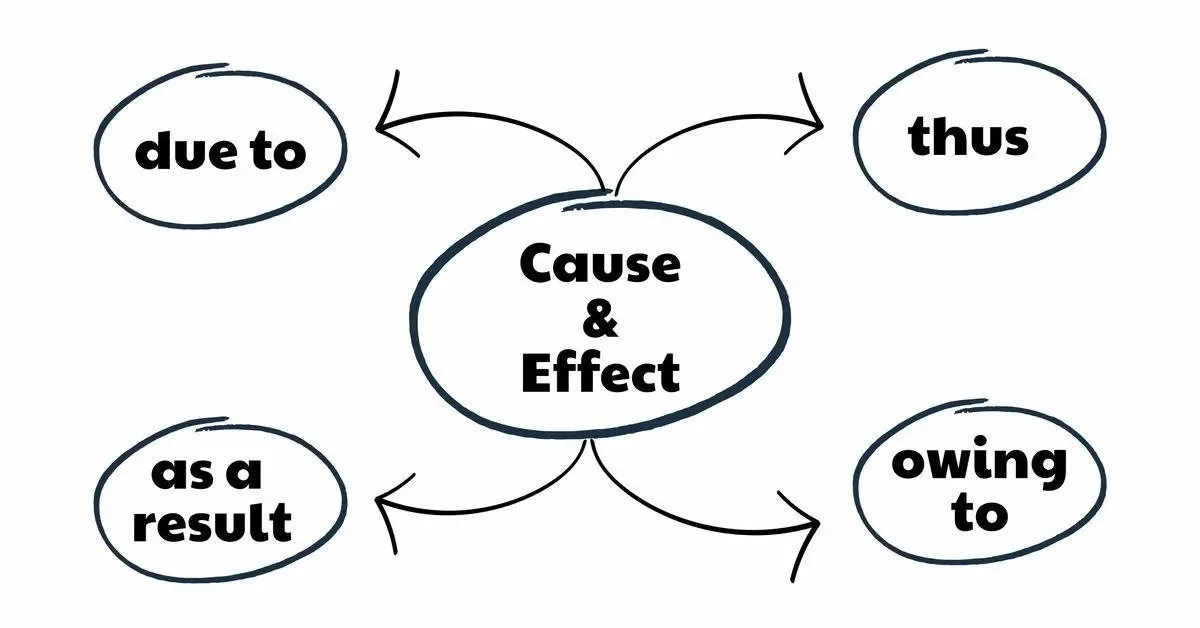
Từ nối | Nghĩa | Ví dụ |
|---|---|---|
due to | vì, do | The event was canceled due to heavy rain. |
owing to | vì lý do, do | Owing to economic challenges, many businesses closed down. |
as a result | kết quả là | The city invested in public transport, and as a result, traffic congestion decreased. |
consequently | do đó, kết quả là | He didn’t study hard, consequently, he failed the exam. |
thus | do đó | The new policy was implemented, thus improving the quality of education. |
2. Từ nối chỉ tương phản (Nâng cao hơn but, however)
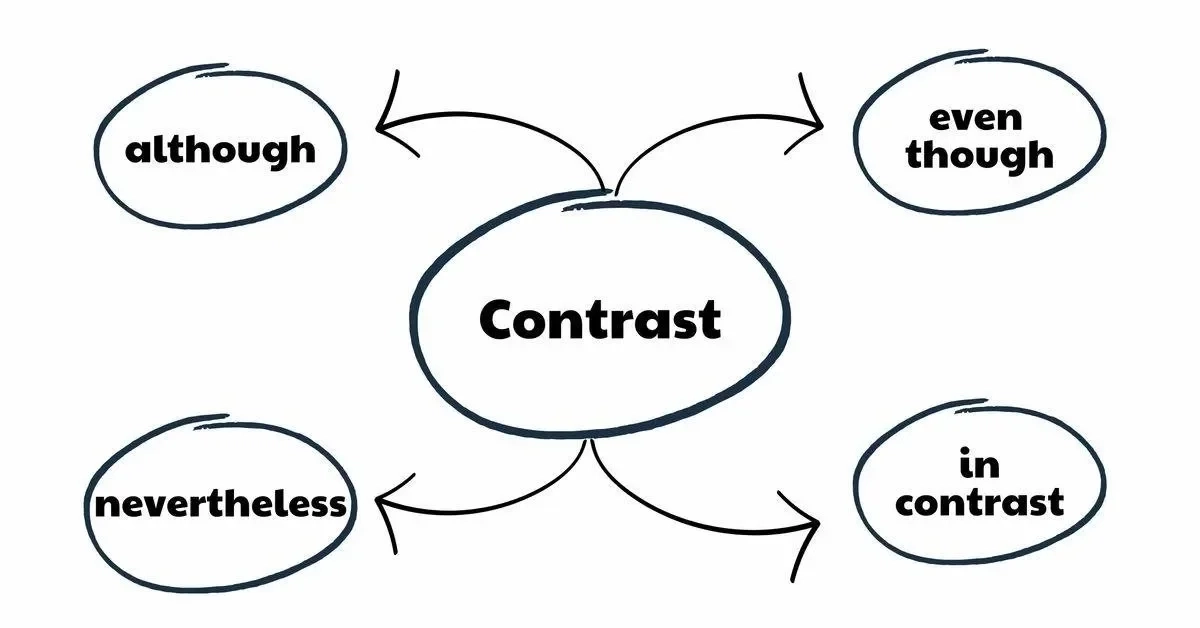
Từ nối | Nghĩa | Ví dụ |
|---|---|---|
nevertheless | tuy nhiên, mặc dù vậy | He was not feeling well; nevertheless, he decided to attend the meeting. |
on the other hand | ngược lại | Some people prefer city life, on the other hand, others enjoy the peace of rural areas. |
in contrast | trái lại, đối lập | In contrast to last year, the economic situation has improved significantly. |
although | mặc dù | Although the job market is competitive, many graduates find employment. |
even though | mặc dù | Even though technology is advancing rapidly, some people still prefer traditional methods. |
3. Từ nối chỉ bổ sung ý tưởng (Ngoài and, also)
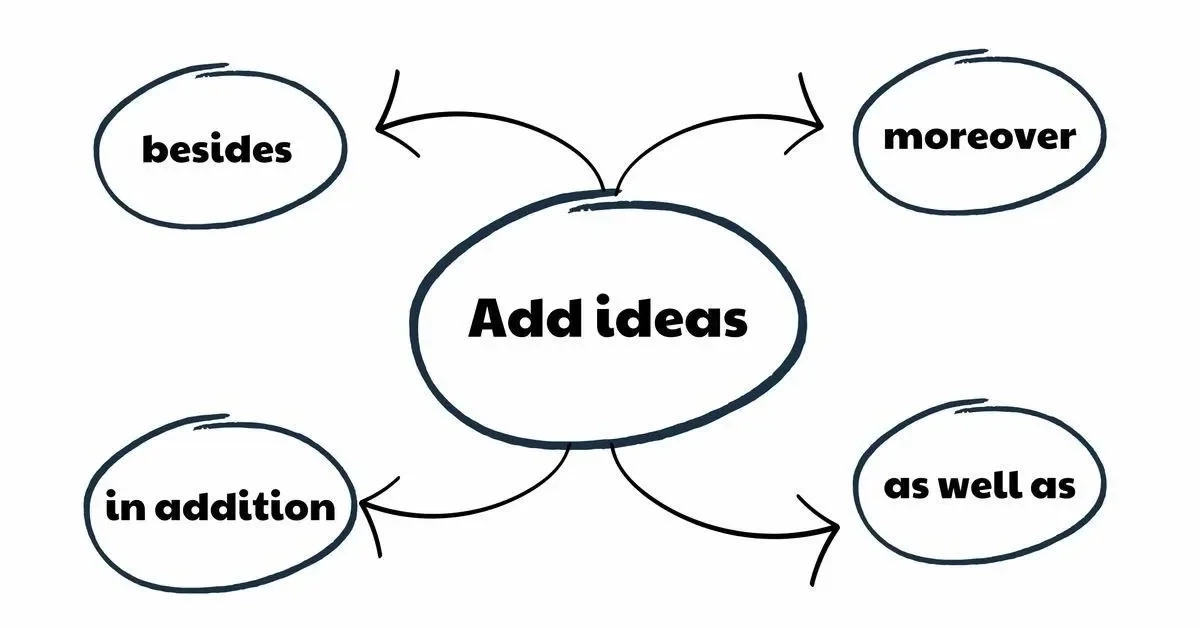
Từ nối | Nghĩa | Ví dụ |
|---|---|---|
furthermore | hơn nữa, ngoài ra | The government has implemented several reforms. Furthermore, they are working to improve public healthcare. |
moreover | hơn nữa | The research was not only groundbreaking but, moreover, it provided practical solutions. |
in addition | ngoài ra | In addition to improving the environment, these policies promote sustainable development. |
besides | ngoài ra | Besides providing jobs, the new factory will also contribute to the local economy. |
as well as | cũng như | The project will benefit the community as well as the environment. |
4. Từ nối chỉ điều kiện và giả định
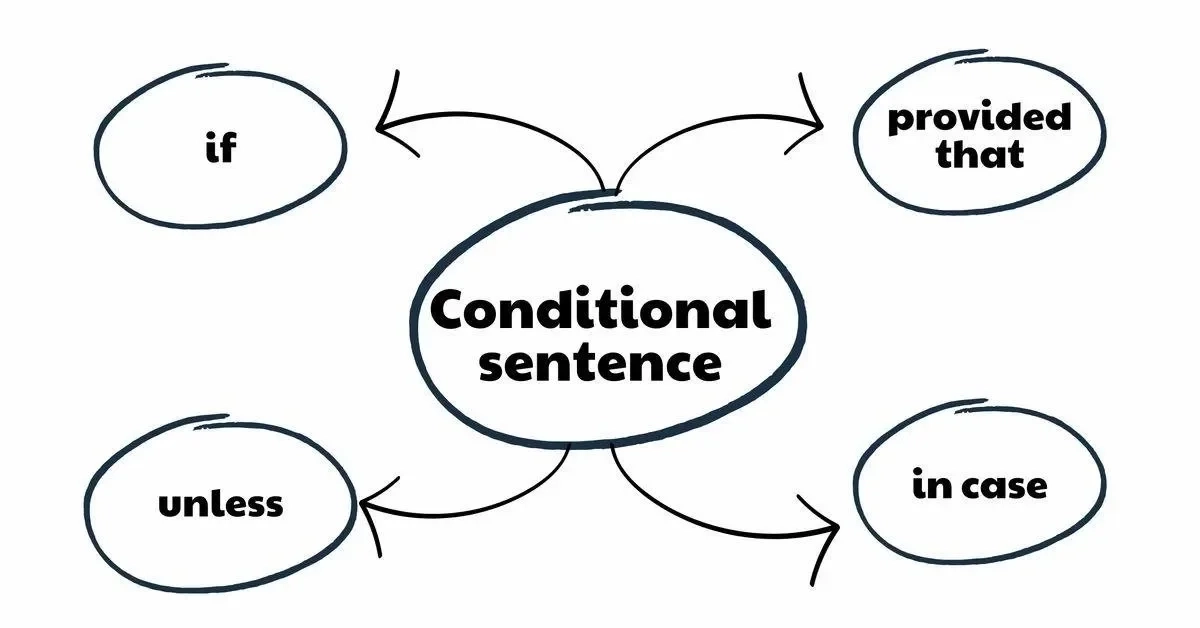
Từ nối | Nghĩa | Ví dụ |
|---|---|---|
if | nếu | If students are given proper guidance, they can achieve great success. |
provided that | với điều kiện là, giả sử | Provided that the government takes action, air pollution can be reduced. |
unless | trừ khi, nếu không | I will attend the seminar unless there is an urgent matter to attend to. |
in case | phòng khi | Bring an umbrella in case it rains tomorrow. |
as long as | miễn là | You can join the program as long as you meet the criteria. |
5. Từ nối chỉ mục đích và kết luận
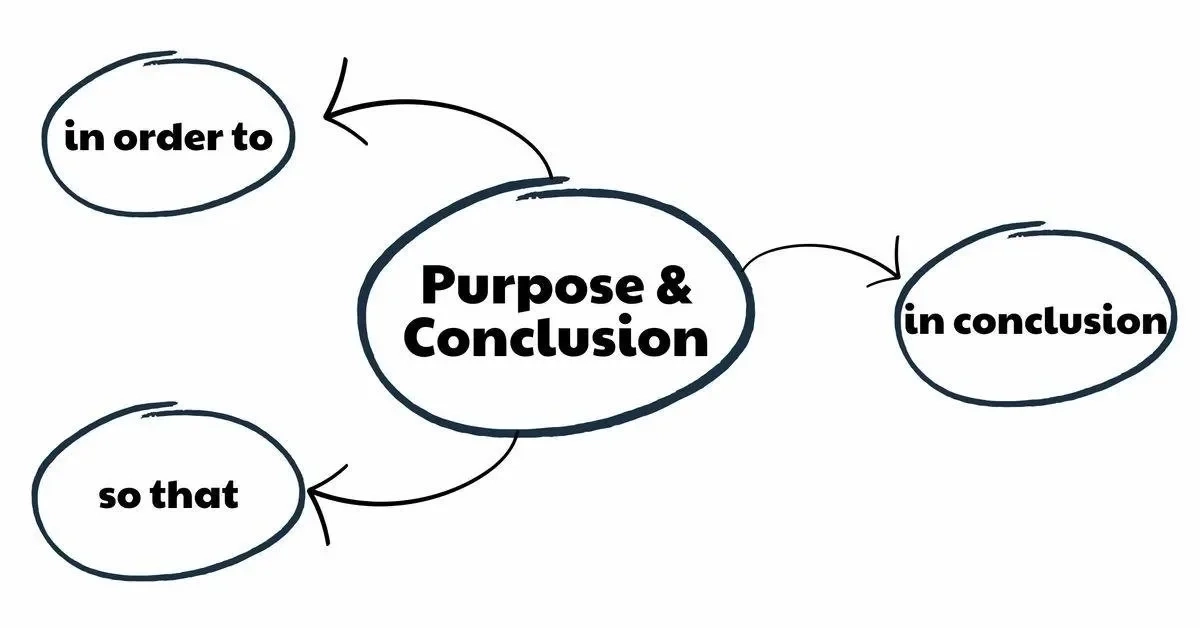
Từ nối | Nghĩa | Ví dụ |
|---|---|---|
in order to | để mà | He studies hard in order to pass the exams. |
so that | để cho | She worked late so that she could finish the project. |
in conclusion | kết luận | In conclusion, while there are some challenges, the benefits of globalization are undeniable. |
Xem nhiều hơn:
Phrasal verbs (cụm động từ) thông dụng cho band 4.5
1. Cụm động từ liên quan đến công việc và học tập
Cụm động từ | Nghĩa | Ví dụ |
|---|---|---|
carry out | thực hiện, tiến hành | Researchers carried out an experiment to test the hypothesis. |
hand in | nộp (bài tập, tài liệu) | Students are required to hand in their assignments by Friday. |
work out | giải quyết, tìm ra giải pháp | The government needs to work out a solution to the housing crisis. |
pick up | học được, tiếp thu | I picked up a lot of useful skills during my internship. |
catch up | bắt kịp, theo kịp | I had to catch up on my studies after being sick for a week. |
2. Cụm động từ liên quan đến xã hội và giao tiếp
Cụm động từ | Nghĩa | Ví dụ |
|---|---|---|
get along | hòa hợp, có quan hệ tốt | Many students get along well with their peers in group activities. |
bring up | đề cập đến, nêu lên | She brought up the issue of climate change in the meeting. |
put up with | chịu đựng, chấp nhận | It's hard to put up with the noise in the city center. |
run into | tình cờ gặp | I ran into an old friend while I was traveling abroad. |
open up | chia sẻ, mở lòng | He opened up about his experiences during the interview. |
3. Cụm động từ liên quan đến môi trường và xã hội
Cụm động từ | Nghĩa | Ví dụ |
|---|---|---|
cut down on | giảm thiểu, cắt giảm | The government needs to cut down on carbon emissions to combat climate change. |
take over | tiếp quản, chiếm lĩnh | A new company took over the business last year. |
give off | phát ra, tỏa ra | The factory gives off harmful emissions into the air. |
put out | dập tắt (lửa) | Firefighters quickly put out the blaze. |
throw away | vứt đi | People should avoid throwing away plastic products to reduce waste. |
4. Cụm động từ liên quan đến công nghệ và tương lai
Cụm động từ | Nghĩa | Ví dụ |
|---|---|---|
come up with | nghĩ ra, đưa ra (ý tưởng) | Scientists are coming up with new methods to recycle plastic. |
break down | hỏng, ngừng hoạt động | The machine broke down during the production process. |
set up | thiết lập, cài đặt | They set up a new online platform for students to access learning materials. |
bring about | mang lại, gây ra | The development of AI will bring about major changes in the job market. |
take off | cất cánh, phát triển mạnh mẽ | Technology startups are beginning to take off in emerging markets. |
Lưu ý về ngữ pháp khi sử dụng phrasal verbs
Transitive vs. Intransitive:
Transitive phrasal verbs: Cần có một tân ngữ đi kèm. Ví dụ: She brought up the topic of climate change (có tân ngữ topic).
Intransitive phrasal verbs: Không cần tân ngữ. Ví dụ: They get along very well.
Phrasal Verbs trong câu hỏi:
Khi sử dụng phrasal verbs trong câu hỏi, bạn thường đặt động từ lên trước chủ ngữ. Ví dụ: What did you pick up during your trip to Europe?
Tách rời các phần của phrasal verbs:
Một số phrasal verbs có thể được tách ra khi có tân ngữ. Ví dụ: She handed the assignment in late có thể thay thế bằng She handed in the assignment late. Tuy nhiên, không phải tất cả phrasal verbs đều có thể tách rời được.
Ứng dụng vào bài thi IELTS Speaking & Writing
Trong phần Writing của bài thi IELTS, từ vựng đóng vai trò quan trọng giúp bạn đạt được điểm cao hơn. Việc sử dụng từ vựng phong phú, chính xác và tự nhiên có thể giúp bài viết của bạn trôi chảy và dễ hiểu hơn. Dưới đây là các kỹ thuật và ví dụ giúp bạn cải thiện band điểm Writing.
So sánh từ vựng IELTS and 4.5 và band 5.5-6.0
Band 4.5: "The environment is very important to people, but many people don't care about it."
Band 5.5-6.0: "The environment plays a crucial role in human life; however, a significant number of individuals neglect its preservation."
Câu thứ hai có sự thay đổi về từ vựng và cách cấu trúc câu, sử dụng từ học thuật ("crucial", "preservation") và từ nối ( "however") để tạo sự mạch lạc và liên kết chặt chẽ hơn.
Kỹ thuật Paraphrasing với từ vựng nâng cao
Paraphrasing (diễn đạt lại ý) là một kỹ năng quan trọng trong IELTS Writing. Việc sử dụng từ vựng nâng cao giúp bạn tránh lặp lại các từ đơn giản và tạo ra sự phong phú trong bài viết.
Ví dụ:
Original: "The government should spend more money on education."
Paraphrased: "It is essential for the government to allocate more funds to the education sector."
Cách tránh lặp lại từ trong bài viết
Để tránh lặp lại từ quá nhiều, bạn có thể sử dụng các từ đồng nghĩa hoặc cấu trúc câu khác nhau. Việc này sẽ giúp bài viết của bạn trở nên tự nhiên hơn và dễ tiếp cận hơn với người đọc.
Ví dụ:
Lặp lại: "Technology is very important. Technology helps in many areas."
Sử dụng từ đồng nghĩa: "Technology plays a vital role in various fields, providing innovative solutions."
Kỹ thuật sử dụng Collocation để viết tự nhiên hơn
Collocations giúp bài viết của bạn tự nhiên và dễ hiểu hơn, vì chúng phản ánh cách người bản ngữ sử dụng từ trong ngữ cảnh thực tế. Thay vì chỉ sử dụng các từ đơn lẻ, hãy kết hợp các từ với nhau theo cách tự nhiên.
Ví dụ:
Không tự nhiên: "Many people have high education."
Collocation tự nhiên: "Many people have a high level of education."
Cách lồng ghép từ học thuật vào bài viết
Khi viết bài IELTS, sử dụng từ vựng học thuật không chỉ làm tăng độ chính xác mà còn giúp bài viết của bạn có chiều sâu hơn. Những từ như "impact", "consequence", "analyze", "theory" là những từ học thuật bạn có thể áp dụng trong phần Task 2.
Ví dụ:
Không học thuật: "This is an important issue."
Có học thuật: "This is a significant issue that requires thorough analysis."
Cách sử dụng từ vựng để nâng band điểm Speaking
Trong phần Speaking, sử dụng từ vựng phong phú và chính xác giúp bạn thể hiện khả năng ngôn ngữ của mình rõ ràng hơn. Việc mở rộng câu trả lời và lồng ghép các từ nối cũng giúp câu trả lời mạch lạc và dễ hiểu hơn.
So sánh từ vựng IELTS band 4.5 và 5.5-6.0
Band 4.5: "I like to go to the park."
Band 5.5-6.0: "I really enjoy spending time in the park because it allows me to relax and clear my mind."
Câu thứ hai không chỉ sử dụng từ vựng phong phú hơn mà còn mở rộng câu trả lời, giải thích lý do tại sao bạn thích đi công viên.
Cách mở rộng câu trả lời
Để nâng band điểm Speaking, bạn cần biết cách mở rộng câu trả lời. Bạn có thể sử dụng các cụm từ, tính từ, trạng từ, và câu điều kiện để giải thích rõ ràng hơn.
Ví dụ:
Câu ngắn: "I enjoy reading books."
Câu mở rộng: "I find reading books incredibly relaxing, especially fiction, as it allows me to escape into different worlds."
Kỹ thuật sử dụng từ nối
Từ nối không chỉ giúp bạn liên kết các ý trong câu mà còn giúp câu trả lời của bạn trở nên mạch lạc hơn. Việc sử dụng các từ nối như "furthermore", "moreover", "on the other hand" có thể giúp bạn phát triển câu trả lời một cách logic.
Ví dụ:
Không sử dụng từ nối: "I like to swim. I also like to run."
Có từ nối: "I enjoy swimming as it is refreshing; moreover, running is a great way to stay fit."
Phương pháp thêm chi tiết với từ vựng đa dạng
Một cách hiệu quả để nâng band điểm Speaking là thêm chi tiết và lý do vào câu trả lời của bạn. Bạn có thể làm điều này bằng cách sử dụng tính từ, trạng từ, hoặc các cụm từ mô tả.
Ví dụ:
Câu ngắn: "I like traveling."
Câu mở rộng: "I absolutely love traveling, especially to exotic destinations, as it gives me the opportunity to experience different cultures and cuisines."
Cách xử lý khi không nhớ từ chính xác
Khi không nhớ chính xác từ vựng, bạn có thể mô tả ý nghĩa của từ đó bằng cách sử dụng các từ đồng nghĩa, mô tả chức năng của nó, hoặc giải thích khái niệm một cách đơn giản. Điều này sẽ giúp bạn giữ được sự tự tin và không bị dừng lại trong bài nói.
Ví dụ:
Không nhớ từ: "I like the thing that is round and you can kick it."
Mô tả: "I enjoy playing football, which is a popular sport played with a round ball."
Đọc tiếp:
Tổng kết
Việc sử dụng từ vựng IELTS band 4.5 một cách chính xác và linh hoạt là yếu tố quan trọng giúp bạn nâng cao điểm số trong cả hai phần Writing và Speaking của bài thi IELTS. Từ vựng học thuật, cụm từ nối, collocations và phrasal verbs không chỉ làm bài thi của bạn trở nên tự nhiên và mạch lạc mà còn thể hiện sự phong phú trong khả năng ngôn ngữ. Bằng cách học và ứng dụng các từ vựng này vào bài thi, bạn có thể dễ dàng nâng band điểm, đặc biệt là khi kết hợp chúng với các kỹ thuật paraphrasing và mở rộng câu trả lời. Bài viết đã tổng hợp từ vựng IELTS band 4.5 theo các chủ đề và loại từ.
Để tiếp tục phát triển và hệ thống hóa vốn từ vựng một cách hiệu quả, người học có thể tham khảo thêm Thư viện sách và tài liệu học IELTS của ZIM. Các tài liệu được biên soạn theo phương pháp Contextualized Learning, giúp người học dễ dàng ghi nhớ và ứng dụng linh hoạt vào bài thi thực tế.
Đặng Nhật Hoàng Linh
Nguồn tham khảo
“How do you get an IELTS band 4.5 for Functional English?.” IDP IELTS Australasia, https://ielts.com.au/australia/prepare/article-how-do-you-get-an-ielts-band-4-5-for-functional-english. Accessed 9 April 2025.
“Cần bao nhiêu từ vựng để thi IELTS | Số lượng dành cho mỗi band điểm.” ZIM Academy, https://zim.vn/can-bao-nhieu-tu-vung-ielts-tung-band-diem. Accessed 9 April 2025.

Bình luận - Hỏi đáp